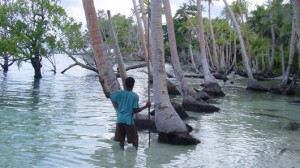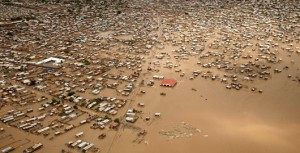Within the political process, power usually rest in the hands of those with power – often in the form of wealth. Thus far in global climate negotiations, we have focused primarily on Annex I (developed nations) and used them as a measurement of what other nations should do. Unfortunately, developed nations often have the least to lose and for this reason I believe small island states and economically developing countries deserve the most attention at the United Nations Framework Convention on Climate Change Conference of the Parties (UNFCCC COP 15) in Copenhagen, Denmark.
In 2005, the World Resources Institute published a report titled “Navigating the Numbers: Greenhouse Gas Data and International Climate Policy,” with the goal of providing data to facilitate international climate change dialogue among policy makers. This seems logical since the goal of this organization – as stated on their website – is to, “Go beyond research to find practical ways to protect the earth and improve people’s lives.”
Hence, I found it odd when they chose to end chapter 2 – titled GHG Emissions and Trends – of their report by stating that, “Successful mitigation agreements need not be global, in the sense of engaging all countries. The least developed countries & small island developing states…are not critical to GHG mitigation efforts” (16). How can an organization devoted to improving people’s lives exclude certain groups?
To answer this question, I first explored the conditions of small island developing states and developing countries as it relates to climate change. Currently, these developing nations are experiencing more frequent and stronger storms, shoreline erosion, damage to agricultural crops, sever food and water shortages, along with a host other weather-related issues

Courtesy of Association of Small Island States
according to the Fourth Assessment Report of the Intergovernmental Panel on Climate Change. If attention is not given to these nations it is likely conditions will intensify and many of these areas will become uninhabitable, as this image from the Alliance of Small Island States shows.
So why then does nations often go ignored despite lobbying groups like the Alliance of Small Island States?
The answer is money, the root of all evils. In the case of the World Resources Institute, they are funded by the U.S. Environmental Protection Agency and for that reason take a western and specifically United States centric approach.

Courtesy of Association of Small Island States: This image is what will permanently become of these regions without immediate action
On a broader scale, wealthier nations attract more attention and for that reason the past UNFCCC Conferences have focused on their actions solely. I would argue that the driving force of climate change policy needs to be centered on the needs of small island states and economically developing countries because they have the most at stake. As S. Kelman states in “How Should We Evaluate Policy-Making Process” (1987), “An honest effort to achieve good public policy…[should] take everyone into account, not just one self” (208). Because our past approach has not worked I would suggest we enter into the UNFCCC COP 15 in Copenhagen, Denmark, with a goal of preserving small island states and economically developing countries from extinction.
By transitioning power to these smaller nations – instead of the wealthier nations that are largely responsible for the problem – we can hopefully reach a consensus, something many think is otherwise impossible.
Tags: Small Island States